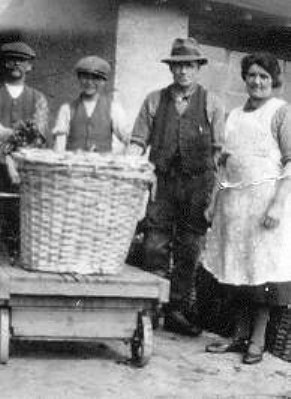
James Willshire had been running the alehouse The Plough for several years with the help of his wife Margaret, who was four years older than him. He had been an innkeeper and master brewer for many years; his father had taught him the brewing trade, which he had combined with being a cooper. Now in his sixty-third year and with his legs not so good, James was still able to change the barrels when needed, putting full barrels on the racks and taking the empties out to the store at the back of the pub. He sat each evening with his one pint, along with the other old regulars, puffing away on their pipes and discussing the harvest- the cost of feed etc. and other village gossip.
Now in his sixty-third year and with his legs not so good, James was still able to change the barrels when needed, putting full barrels on the racks and taking the empties out to the store at the back of the pub. He sat each evening with his one pint, along with the other old regulars, puffing away on their pipes and discussing the harvest- the cost of feed etc. and other village gossip.
James and his wife Margaret had worked together all their married life, and, as their two sons Victor and Ernest had left home to follow their own careers, they decided to train Laura in the art of innkeeping, enabling them both to take life a little easier. Laura had done well at school and was quick with numbers. She was friendly and polite and very willing to learn. Initially Margaret kept Laura behind the counter, teaching her how to pull a pint, how to measure a spirit drink and, most importantly, how to deal with customers.
“Always be ready to listen when a customer feels like talking, but never offer your own opinion”, was one of her maxims. “Never repeat what one customer says, to another”, was another. “Let them do the talking and you do the listening”, she would advise. Then she might promptly lean on the bar and whisper to a customer “did you hear that…….”
Laura, now 26 years old, ran the inn almost singlehandedly, though of course her father was still the owner. She employed a pot man; though employed was not quite the correct description for their arrangement – he would collect the empty pots and jugs from the tables in the bar and outside in the yard, and also sweep up the sawdust after closing time and lay fresh for the next day – as payment she gave him a free pint of ale with some bread and cheese each midday and maybe a bowl of broth for dinner, so he was grateful for her generosity. Not that you would know this, as he was a morose old man with very little to say and grunted replies to anyone who spoke to him.
The young lads of the valley often gathered on the bridge on the square after their various days’ work, mostly still in their working clothes and heavy boots, the smithy’s apprentice with his shirt spotted with burn marks from the forge, the thatcher with bits of straw in his hair or poking from his cap, and the stable hand smelling strongly of horses.
Their most popular conversation was in which of the armed forces they would prefer to be enlisted, which regiment or battalion they would choose. Some wanted to be with the horse, some with the rifle, and some on the high seas. All were very keen, as soon as they reached the age of 18, that they would be off to the Drill Hall in Andover to collect the King’s shilling. The older men sitting outside the ale house would listen, saying nothing. Their memories of their time in the Second Boer War, nay some even in the first, and the horrors they saw and maybe suffered there, were etched in their brains and carried heavily in their hearts.
How could they pass that knowledge and experience on to these young men? To persuade them that war might not be the great adventure they all dreamed of. They knew they couldn’t, so the old chaps carried on puffing their pipes, chewing their baccy and drinking their beer.
Notes
-James Willshire is shown in the 1911 census as occupying The Plough, having been the proprietor of a pub in Bradford on Avon in 1901; he is still there in the 1912 trade directory but at some point before 1920 he had moved again, this time to The Railway Inn (now The Bourne Valley Inn).
-We do not know the identity of ‘the pot man’ but The Plough was used by the farmers and was a busy pub at the centre of the village. Laura would not have been working on her own and the employment of a pot man seems a reasonable inference.
The Conservation Area Description says:
The Old Plough, formerly an inn, dates from 17th and 18th century. Although only of one-storey and attic, the significant length of the building is emphasised by its steeply pitched, long thatched roof slopes, and simple elevational treatment. Of intrinsic architectural merit, its location at the river crossing, and its dominance of views through the space, makes it a key building in the Conservation Area.
The photograph of The Plough, behind the bridge over the Bourne, is again one of those that came to me without indication as to copyright owner. If this is you, please contact us in the comments below so that we can properly acknowledge you or, if you prefer, remove it from this blog.
Our New Contributor
This is the first of what we hope will be many posts by Win Bourne, a ‘member’ of our history group. Thank-you, Win!









